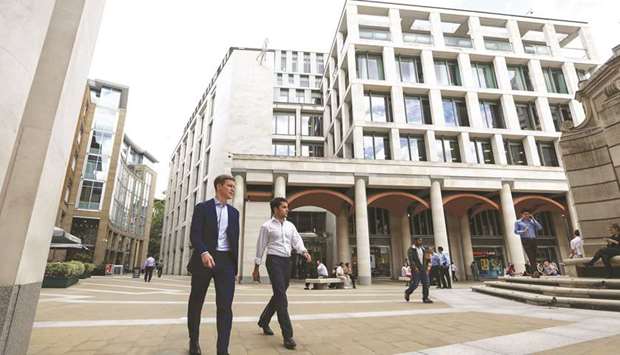Global stock markets were steady yesterday following sharp losses the previous session, with investors spooked by a steep rise in coronavirus cases and continued uncertainty over a pre-election stimulus package in Washington.
London’s FTSE 100 closed 0.2% up at 5,785.65 points, Frankfurt’s DAX 30 ended 0.1% down at 12,543.06 points and Paris’ CAC 40 was flat at 4,851.38 points at close.
The EURO STOXX 50 closed 0.3% down at 3,170.09 points.
Oil was firmer, along with the dollar, while the pound slipped after gains made on hopes that on-off-on-again post-Brexit trade talks might finally make some progress.
Better-than-expected new US jobless benefit claims and other US data were welcomed but analysts said the underlying economic situation remained concerning and made the case for a fresh stimulus package all the more pressing.
“With fiscal relief package hopes dimming, this situation is worrisome,” Gregory Daco of Oxford Economics tweeted.
David Madden, analyst at CMC Markets UK, said that while investors expect some sort of a package eventually “there isn’t much hope that it will be achieved soon.”
The deadlock in Washington over the stimulus package comes as coronavirus cases surge across the US, with many Americans already struggling and observers fearful the economy could be hit badly.
The White House has said it will agree to a $1.9tn package but that is $300bn short of what Democrats have put forward and much more than many Republicans are willing to swallow.
Analysts said markets have been jolted also by US director of National Intelligence John Ratcliffe’s revelations that Russia and Iran have meddled in the election run-up, sending “spoofed” e-mails to Americans “designed to intimidate voters, incite social unrest, and damage President Trump”. Trump and his Democratic challenger Joe Biden face-off yesterday with all bets off as to how it will turn out after a first debate turned into a shouting match and the second was dropped.
The pound gave up some of the strong gains won on Wednesday against the dollar and euro on hopes of a post-Brexit trade deal between Britain and the European Union.
EU negotiators headed to London yesterday to resume talks after Britain called off a boycott, with both sides vowing to work round the clock to seal a deal in the short time left.
Britain, meanwhile, yesterday said it had agreed a provisional trade deal with Norway, Switzerland and two other non-EU partners to ensure continuity after its Brexit divorce from the European Union.
Covid-19 cases have climbed in Europe, with Spain becoming the first Western European nation to exceed 1mn infections and Italy setting a record increase in daily cases.
The number of confirmed cases in Germany jumped by more than 10,000 in a single day for the first time.
“We are more cautious on Q4 growth than we were a few weeks ago,” said Julien Seetharamdoo, head of European market investment strategy at Zurich Insurance Group.
“We don’t expect anything like Q2, but it’s more likely that Q4 will be close to stagnation in terms of growth as restrictions impact activity in certain parts, especially the services sector.”
The broader selloff took a toll on tech stocks, the worst performing sector so far this week.
Data showed fund flows into European stocks have surged in recent months as global investors looked away from US equities ahead of the presidential election and on concerns over high valuations.
British Airways-owner IAG slid 3% after it further downgraded its capacity outlook for 2020.
Third-quarter earnings, however, continue to be largely better than expected.
French electrical equipment group Schneider Electric SE rose 3%, giving the biggest boost to STOXX 600, after it raised its 2020 revenue and margin forecasts.
Unilever, rose 1.2% after the Anglo-Dutch consumer group reported a stronger-than-expected return to quarterly sales growth, led by emerging markets.
Swedish hygiene products group Essity fell 4.6% as quarterly sales suffered from the stay-at-home trend.

Pedestrians pass the London Stock Exchange Group offices in Paternoster Square. The FTSE 100 closed 0.2% up at 5,785.65 points yesterday.
